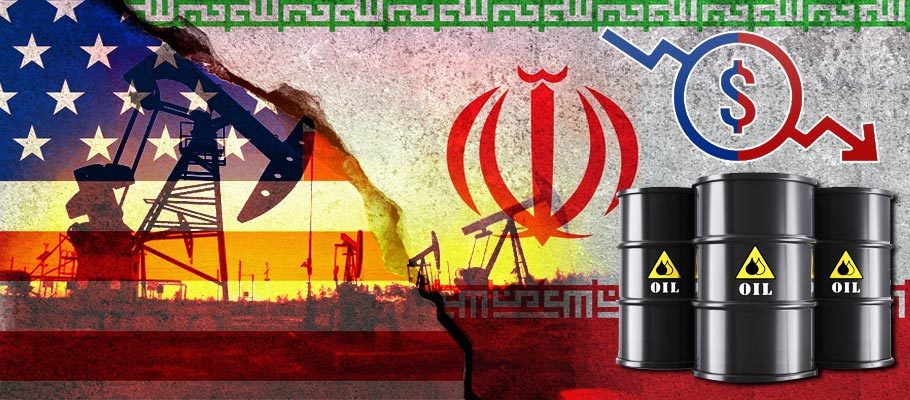
Published: August 21st, 2020
As Washington sought to extend its arms embargo on Tehran past the October deadline, crude oil prices swung, albeit moderately. While the geopolitical tensions are not new among oil traders, the gust is unprecedented this time around.
The U.S. and Iran are on a collision path, again! This premise is borne of the fact that the U.N. Security Council debated and voted to extend an arms embargo against Iran. This initiative, led by the U.S., fell on its face when the Security Council voted not to extend the sanctions.
However, Iran most likely noted the world’s largest economy’s intentions, and knowing Washington and its antics, it would be foolhardy to believe that they will not try another angle. While holding a joint news conference after meeting the Austrian Foreign Affairs Minister Alexander Schallenberg in Vienna, the U.S. Secretary of State, Mike Pompeo, said that his country would do anything possible to renew the embargo.
According to Margaret Basheer, the Voice of America United Nations’ correspondent, the Security Council’s failure to extend the expiring embargo will likely force Washington to seek a re-imposition of the prior sanctions on Iran in their entirety.
Pompeo was quoted castigating the U.N. Security Council, terming the vote a failure on the part of the U.N. body to endorse its mandate to maintain international peace and security. Pompeo said the Security Council underperformed by rejecting a reasonable resolution to prolong the 13-year-old arms embargo on Iran.
According to Pompeo, this single act of commission by the Security Council paves the way for the world’s leading sponsor of terrorism to stock up on conventional weapons, which it will sell without any specific restrictions for the first time in more than ten years.
Pompeo said the U.N. body’s failure to act decisively to safeguard the globe’s peace and security is inexcusable. Washington’s latest attempt to make Tehran tow the weapons line only got two votes in favor, with the Dominican Republic being the only sympathizer of Uncle Sam.
Russia and China, who are opposed to the sanctions, voted against the U.S. wishes while 11 other council member nations abstained from the vote. A resolution in the U.N. Security Council requires at least nine yea votes to sail through, and that is if no veto is adopted.
Iran has come out to condemn any attempts to impose sanctions or put any Security Council restrictions. A statement by the country’s U.N. ambassador, Majid Takht Ravanchi, noted that Iran would meet such attempts severely, adding that his country’s options are not limited.
While the Ambassador was cut in his statement, Iran’s foreign ministry’s spokesman, Abbas Mousavi, sounded almost victorious. In the 75 years that the U.N. has been in existence, the spokesman said that the U.S. has never been so alone on an issue.
He said that despite all the shuttle diplomacy trips, pressure, and the constant hawking, America could only get the sympathy of one small country (Dominican Republic) to vote in its favor.
He added that his country’s active diplomacy, together with the nuclear deal’s legal force, has defeated the U.S. again in the Security Council. China’s U.N. mission echoes the sentiments of Iran. In a tweet on Saturday, August 15, the populous nation’s mission said that the vote results indicate that unilateralism has no support, and bullying always fails. The tweet added that efforts of some countries’ attempts to put their interest above the common good of the international community always hit a dead end.
Experts think that these renewed tensions may boost the price of Brent. International entanglements between Iran and the U.S. have always come with an oil-positive risk-off dynamic. And, investors are all too aware of this situation.
The entire 2018 and most 0f 2019 saw crude oil prices spiking on several similar occasions. In early 2020 when forces allied to the U.S. killed Major General Qasem Soleimani, former commander of the Quds Force of Iranian’s Islamic Revolutionary Guard Corps, fears of an all-out military confrontation led to a spike in the price of crude oil.
The same situation happened during the many conflicts that marred in the Strait of Hormuz in 2019. During the period in question, the 96 miles-long and 21 miles-wide shipping route witnessed Iran divert a British-flagged tanker. Two tankers were damaged using explosions, and another four ships blasted within the United Arab Emirates’ territorial waters.
During these incidences, the price of Brent shot up. It is safe to assume that the escalation of tensions between Washington and Tehran, this time via the former’s appeal for the imposition of sanctions against the latter, will produce the same result.
With the American elections coming later this year, incumbent President Donald Trump may be tempted to take an aggressive approach against Tehran to gain political mileage. The president’s poor handling of the coronavirus outbreak and spread has sent him seeking redemption, and strong-arming Iran looks like a panacea.
However, unlike in earlier times, the crude oil prices have maintained a downward trend despite the tensions, probably because of the reduced demand brought about by the lockdowns earlier in the year.
Experts hold the thought that the reopening of economies currently in place will heighten the demand and lead to a spike in price. If the situation plays out as the experts foresee, the usual trends may come into play and send the prices soaring even higher.
The past week saw Iran and the U.S. renew tensions following the latter’s attempt to have the U.N. Security Council extend the former’s arms embargo. If recent trends are anything to go by, such tiff may lead to a spike crude oil prices. The U.S. is not showing any signs of relenting on its quest, and Tehran has promised to retaliate should the U.S. remain true to its threats.